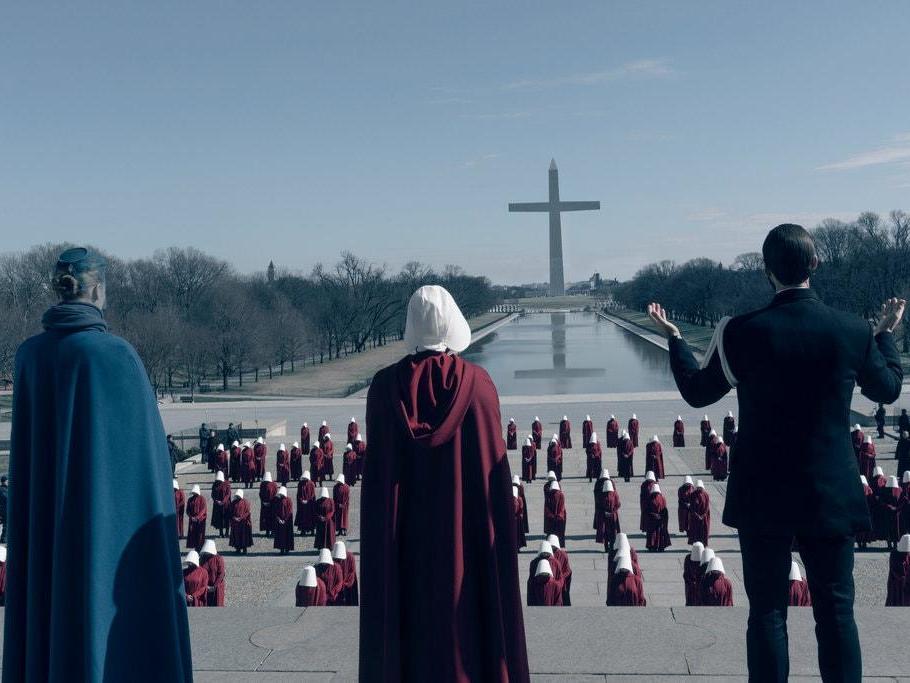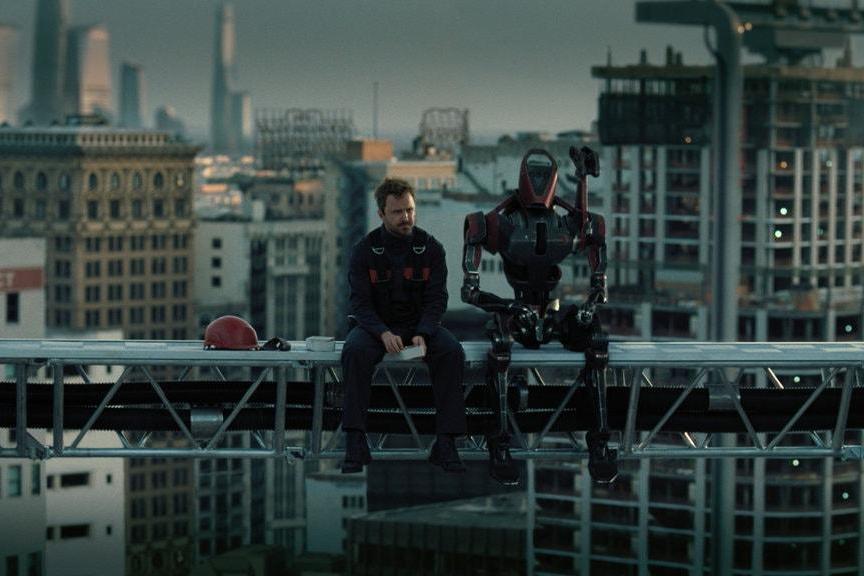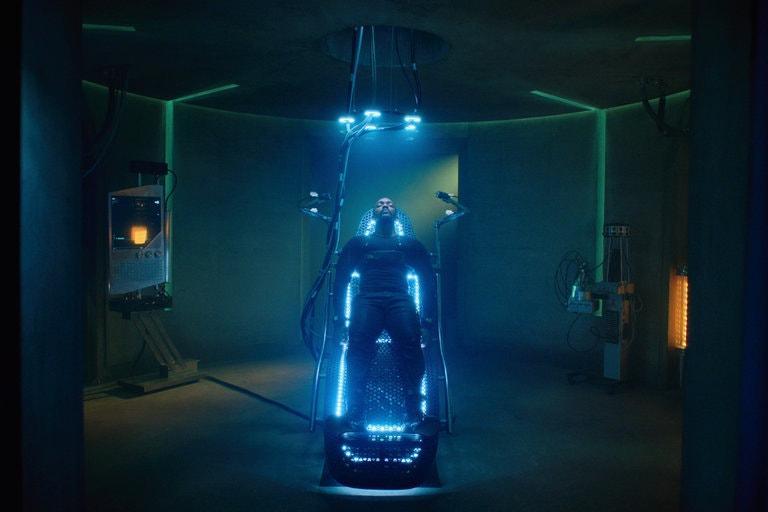The Independent's journalism is supported by our readers. When you purchase through links on our site, we may earn commission.
What is the future of dystopian television during a global pandemic?
The producers of ‘The Handmaid’s Tale’, ‘Westworld’ and others talk to Dave Itzkoff about their invented nightmares – and how and whether they should respond to a crisis in the real world

Your support helps us to tell the story
From reproductive rights to climate change to Big Tech, The Independent is on the ground when the story is developing. Whether it's investigating the financials of Elon Musk's pro-Trump PAC or producing our latest documentary, 'The A Word', which shines a light on the American women fighting for reproductive rights, we know how important it is to parse out the facts from the messaging.
At such a critical moment in US history, we need reporters on the ground. Your donation allows us to keep sending journalists to speak to both sides of the story.
The Independent is trusted by Americans across the entire political spectrum. And unlike many other quality news outlets, we choose not to lock Americans out of our reporting and analysis with paywalls. We believe quality journalism should be available to everyone, paid for by those who can afford it.
Your support makes all the difference.They tried to warn us. In their television dramas, they sought to depict the most chillingly dystopian scenarios they could imagine – terrifying alternative realities in which life as we knew it had been devastated by revolutions, plagues, technology run amok or hordes of bloodthirsty zombies. At the time, the writers of these series – The Handmaid’s Tale, Westworld and others – wanted to entertain and challenge audiences with dark reflections of society that they could tell themselves were avoidable or too outrageous to transpire.
But now, amid the uncertainty of the coronavirus pandemic, the people who make these shows are looking at their work in a different light. These creators and producers are in no mood to gloat or to chastise viewers for failing to heed their admonitions. They do have a clear understanding though of why we remain drawn to dystopian entertainment, and they wonder whether current events will have some lasting impact on their work. They also admit to pangs of remorse for asking audiences to engage with the nightmares they invent.
“You do feel guilty about putting these anxieties in people’s minds,” says Bruce Miller, creator and showrunner of Hulu’s adaptation of The Handmaid’s Tale.
“There’s no way not to feel like you somehow wished things into being,” he says. “But it shows you how television, and drama in general, has something to tell people about how the world works.”
Alison Schapker, the showrunner of Netflix’s dark science-fiction series Altered Carbon, says she has become acutely aware of how her work is being received “when television has become one of the fundamental outlets we have to pass time and process what’s happening in the day”. She added that viewers’ amplified discomfort would invariably seep back into her writing. “What I want to say as a storyteller always comes from the life I’m living, and that life has been completely upended,” Schapker says.
In The Handmaid’s Tale, adapted from the Margaret Atwood novel, the United States has been ravaged by disease and environmental disaster, and remade as a totalitarian state where women are enslaved. Altered Carbon, based on Richard K Morgan’s novel, imagines a future when immortality is made possible by technology – but only for those who can afford it. In HBO’s Westworld, adapted from Michael Crichton’s thriller, lifelike automatons are subjugated in a world of declining morals and brutal economic disparity.

While these dehumanising scenarios have proliferated in popular culture, Jonathan Nolan, a co-creator and showrunner of Westworld, says they all derive from a shared human curiosity to imagine society under stress – while observing from a safe distance.
“As a culture, we’re collectively trying out different strategies and outcomes, trying to get a sense for where we might screw things up,” Nolan says. He adds that although there are utopian fantasies out there too, “people are more interested in watching versions of the world in which things have gone wrong than have gone right”.
Lisa Joy, Nolan’s fellow creator and showrunner, says dystopian narratives can serve as a psychic proving ground to explore in moments of relative calm. “If you look at history, there’s cycles of war, of poverty, strife, famine and disease,” she says. “You know it would be hubris to think we were immune to those cycles forever.”
Part of my job is to be a delicate flower, to feel what’s going on in the world. It does change what we write and it will certainly change what we discuss, story-wise
Alex Garland, who wrote and directed the high-tech thriller Devs for FX on Hulu, says its central ideas – “massive tech companies with unregulated authority, massive imbalances of power and wealth” – required no conjecture on his part. “There’s nothing remotely insightful about pointing it out,” he says. “It’s completely obvious. We all know it’s there.”
Garland has also contemplated apocalyptic scenarios in his films Annihilation (which finds Earth imperilled by alien mutation) and 28 Days Later (the planet is overrun by zombies). He explains that these kinds of stories offer an enticing form of “wish fulfilment”.
“When I was a kid and watching zombie movies,” Garland says, “I’d partly be thinking zombies are scary. But I’d also be thinking, wow, it would be amazing if you could bust into any shop and take whatever you wanted.” Of course, Garland says, this kind of voyeurism is satisfying when it occurs “in anticipation, from the safety of things not being like that”. He says creators and audiences have convinced themselves that “by engaging with the dystopia, that will vaccinate us against them happening”. Now that civilisation has arrived at an authentic crisis, not unlike the kinds he has dramatised, Garland cannot help but wonder if this storytelling has been futile.
“It’s a bit like doing a Twitter protest,” he says. “It sounds like I’m saying something. But what’s the actual result? Probably just another noise bouncing around the echo chamber.”
Do these dystopian stories really have any power to prepare us for impending adversity? Miller, the Handmaid’s Tale showrunner, says this genre at least offers the comforting perception that individuals can have some control over their chaotic environments. “We always want to tell stories in which one person’s decisions have an effect,” he says. “And in a dystopian world, because it’s more stripped down to its essentials, the choices are simpler. You can take the problem you’re interested in and put it at the centre.”

But in the weeks and months to come, will audiences lose their appetite for imaginary worlds gone wrong, and instead seek out stories where things turn out for the better? These TV producers caution against the idea of rewriting their series to address the coronavirus pandemic head-on. “The thing that’s happening at the moment is completely real,” says Garland, whose work on Devs is mostly complete. “You’re not going to get any meaningful reaction to what is happening now for at least a few years.”
Schapker, from Altered Carbon, echoes these sentiments, saying that these shows do not need to be turned into sentimental fantasies or dismal dirges either. The responsibility of storytellers, she says, is to absorb “the complexity of the moment and reflect it in our work”.
“I don’t think it’s time for saccharine,” she says, “and I don’t think it’s time to just look out my window and stare.” The cast and crew of The Handmaid’s Tale were about two weeks into filming the first new episodes for the fourth season, Miller says, when they had to halt production as concerns about the coronavirus mounted. Whatever transpires between now and when filming is able to resume, Miller says it is unlikely that these episodes will be changed, whether to reference real-life events or to adjust their tone.
“God knows what things are going to be like by the time this season of the show comes out,” he says. “When you try to hit a target and the target hasn’t even materialised yet, it’s a little difficult.” At the same time, Miller says he and his colleagues are still writing the last episodes of this new season, and that it is all but assured the ongoing calamity will influence their process in ways they cannot yet predict.
While their overall goal – “to tell a story and make people feel connected to it” – remains the same, Miller says, “part of my job is to be a delicate flower, to feel what’s going on in the world. It does change what we write and it will certainly change what we discuss, story-wise.” The Westworld producers say they have finished filming the third season of the show, but a lengthy process of post-production and special effects still lie ahead, one that they are trying to figure out how to run remotely while they work from home.
Nolan and Joy say they, too, cannot suddenly turn their show into a sentimental fantasy. “There’s no way to change our creative DNA and write about something that’s not organic to our thoughts,” Joy says. What they can do is follow another dramatic tradition and populate their stories with heroic characters who, Joy says, can stand as “models for people to look at them and say, we’ll soldier on”.
Dystopian narratives, she says, may be “drama about a world that can be cruel, random and broken, but the important thing is that, in the face of a world like that, humans do not have to be cruel, random or broken.”
Join our commenting forum
Join thought-provoking conversations, follow other Independent readers and see their replies
Comments